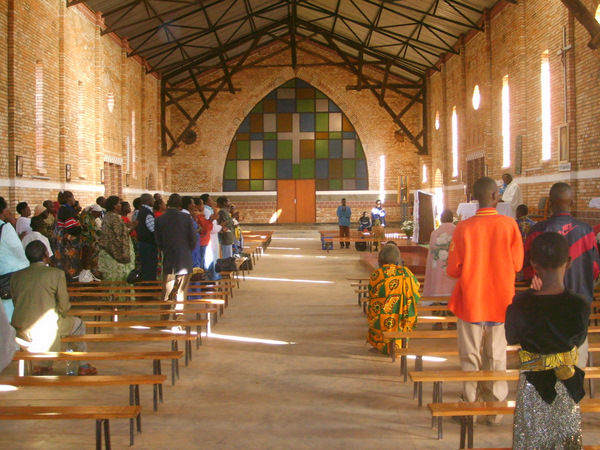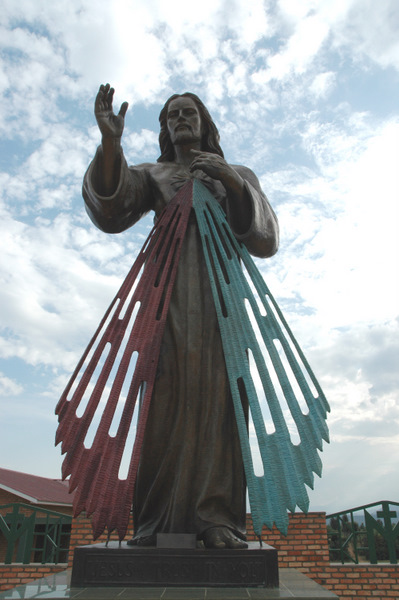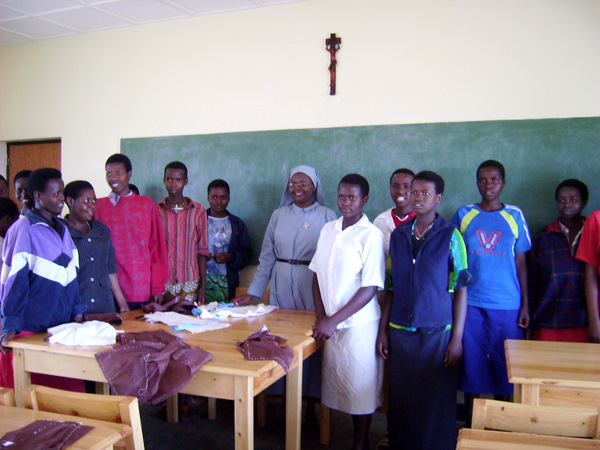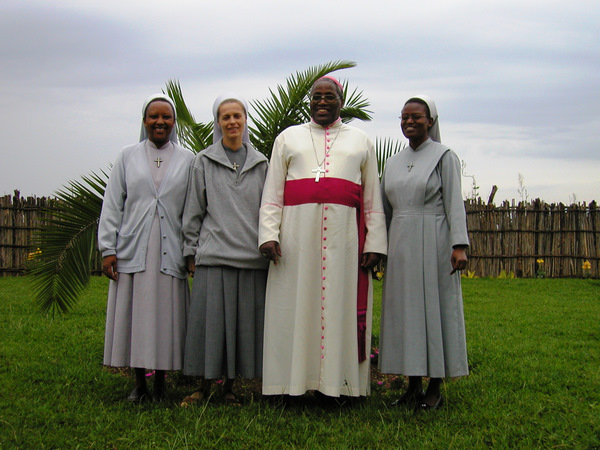Activities and communities around the Shrine of Our Lady of Kibeho
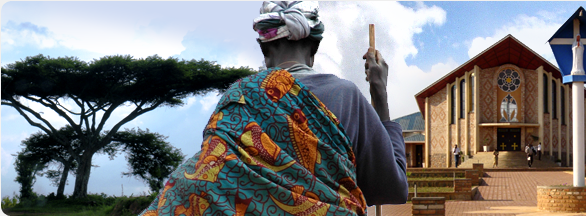
The Shrine of Our Lady of Kibeho appealed to the charisms of various religious communities. Thus, the shrine does not limit its activities to prayer and practices of piety; but it is also a chance of development and welfare for local people, since the projects that the different communities programme and make a reality include educational, social and charitable activities. These activities and communities are as follows:
Kibeho Parish: diocesian clergy
Kibeho parish belonged to the Diocese of Butare up to the year 1992 when the Diocese of Gikongoro was erected and Kibeho parish became part of the new diocese. This parish was characterized by the exceptionally strong faith of its Christians. Indeed, founded in 1934 and dedicated to "Mary Mother of God", Kibeho parish gave a large number of priests and consecrated persons to the Church of Rwanda. Among its sons many became diocesan and religious priests in various congregations and religious orders, while an impressive number of its daughters embraced religious life in various religious families. At the time of the apparitions, Kibeho parish was equipped with pastoral structures:
The parish of Kibeho served as the area of reference for the apparitions and for the occasional pilgrimages in recent years. It is now part of the areas of the Shrine. The parish priest of Kibeho parish is at the same time dean of Kibeho (the deanery consists of four parishes at the moment). The diocese is still trying to improve the infrastructure and the services of this area.
a team of priests responsible for the pastoral activities of the parish and a community of religious sisters involved in the education of children in a primary school and a secondary school for girls. It was in this secondary school, that three students were favoured by the apparitions of Our Lady.
The parish of Kibeho served as the area of reference for the apparitions and for the occasional pilgrimages in recent years. It is now part of the areas of the Shrine. The parish priest of Kibeho parish is at the same time dean of Kibeho (the deanery consists of four parishes at the moment). The diocese is still trying to improve the infrastructure and the services of this area.
Groupe Scolaire Mere Du Verb: Benebikira Sisters
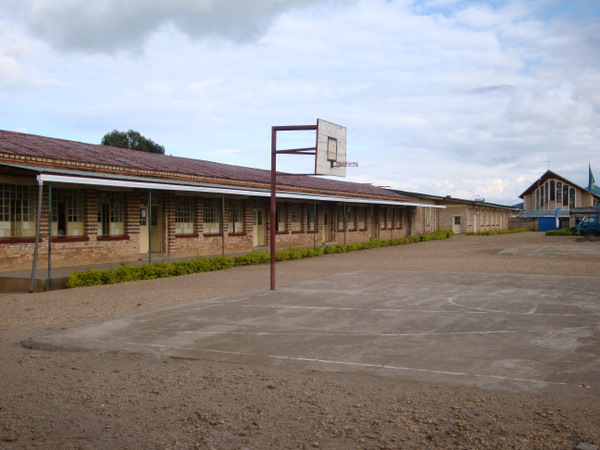
Groupe Scolaire Mere du Verb is a school for girls open since 1967 and entrusted to the congregation of the Benebikira Sisters. It is an integral part of the Shrine for historical reasons: it is within the compound of this school that the apparitions of Kibeho took place, from their beginning to the end. Currently, the Shrine of Our Lady of Kibeho occupies part of the school playground. The diocese has so far resisted all proposals to transfer the school anywhere else.
Groupe Scolaire Marie Merci :diocesian clergy
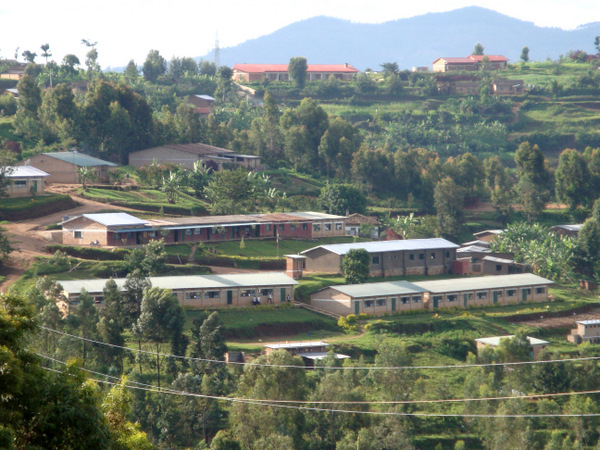
Groupe Scolaire Marie Merci is a school for boys founded in 1986 as a result of the apparitions of Kibeho. Up to 1994, this school was run by the diocesan clergy. After the war and genocide, it was entrusted to a team of laypeople. Currently, since 2009, it is again run by the diocesan clergy.
Pallotti House : Pallottine fathers & Pallottine sisters
The Pallottines are a Society of Apostolic Life within the Roman Catholic Church, founded in 1835 as Societas Apostolatus Catholici (SAC), by the Roman priest Vincent Pallotti (1795-1850). It was from Vincent's visionary desire to unite the factions in the Church and to encourage lay apostolic activity that the Pallottines were born. Pallottines are part of the Union of Catholic Apostolate.
The Union of the Catholic Apostolate – the Pallotine Family
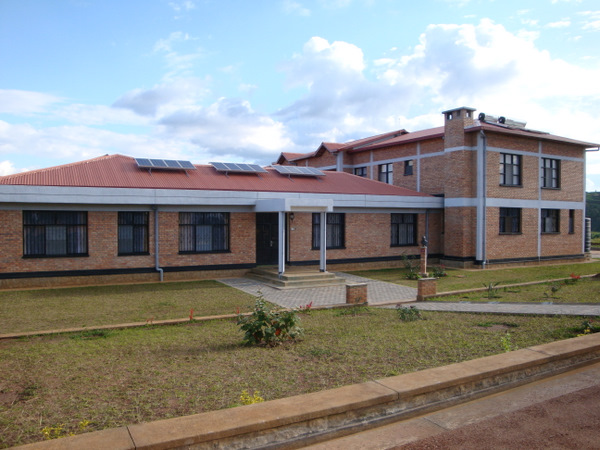
This was the conviction of St. Vincent Pallotti (1795-1850), a conviction strongly confirmed by the Second Vatican Council, a conviction promoted from the time of St. Vincent by the Pallottine Family, which continues to promote it in a special way in our day.
Every member of the People of God is called to play their part in the mission and apostolate of the Church – and the Church will reach its full potential only when all are brought to a profound and living awareness of their call and obligation to collaborate in her life and mission. Not only this, but for individual efforts to have a greater chance of making a lasting difference they need to be organised, to be integrated and directed towards a common goal. For this reason, Vincent Pallotti, through the inspiration of the Holy Spirit, established the Union of Catholic Apostolate, open to all members of the People of God, clerical and lay, young and old, married and single, male and female.
The Pallottine vision is one of lay people, members of consecrated life and clergy all working together, collaborating as equals in carrying out the mission of the Church. The Union aims to revive faith and rekindle charity in the Church and carry these out into the wider world by all possible means. Members of the Union are offered formation in the spiritual and apostolic life in order to build together a family of mutual love and respect and encouragement rooted in the life and love of God, in which each person is helped to discover and welcome the fullness of their own vocation and their own gifts, while at the same time discovering and rejoicing in the complementary vocations and gifts of others. They are encouraged to come together to pray, reflect and receive ongoing formation, with the aim of renewing apostolates which are already being undertaken, and also to reflect particularly about spiritual and temporal needs not presently being met in the Church and the world, and to commit themselves and their talents to addressing these needs to the best of their abilities in a united, committed, organised and discerning way.
Source: http://www.pallottines.ie/union-of-catholic-apostolate [May 23rd, 2011]
Contact: This email address is being protected from spambots. You need JavaScript enabled to view it.
Pallottines Society of the Catholic Apostolate (Pallottine Fathers)
Kibeho Community
The first Pallottine Fathers arrived at Kibeho on November 24th, 2003 at the invitation of Mons. Augustin Misago, Bishop of Gikongoro. Following the contract between the Diocese of Gikongoro and the Holy Family Region, the pastoral animation of the parish of Kibeho and Marian Shrine of Our Lady of Kibeho were entrusted to the Pallottine priests. In August 2008, however, the extent of the collaboration was redefined and the Pallottine Fathers focused on the management of the Marian Shrine, while the parish was given back to the diocesan clergy. In 2009, the community moved into a new house, also accommodating pilgrims.
The Kibeho community is constantly growing in quantity and quality, in a unit of rhythm with the development of the activities of the shrine. At the moment there are four Pallottine priests at the service of pilgrims. That is:
- Father Zbigniew Pawolwski, SAC, Rector of the community and of the Sanctuary
(Phone: + 250/78 830 73 76. Email: This email address is being protected from spambots. You need JavaScript enabled to view it.)
- Father Marc Nzeyimana, SAC, bursar of the community
(Phone: +250/78 884 09 59)
- Father Norbert Nsengiyumva SAC
(Phone: +250/78 227 59 44)
The Pallottine community of Kibeho aims to improve the infrastructure in and around Kibeho as to provide quality service to the incessant flow of pilgrims in search of spiritual nourishment.
The Pallottine Fathers and Sisters share the vision of building a spiritual centre in the neighbourhood of the shrine. For those who want to share this vision and make it a reality in the near future, your donations and offerings will be highly appreciated.
Contact: This email address is being protected from spambots. You need JavaScript enabled to view it.
Society of the Catholic Apostolate (Pallottine Fathers)
The Pallottine Fathers and Brothers take inspiration from their founder St. Vincent Pallotti, born in Rome on April 21, 1795. On 9th January, 1835 through divine inspiration, he founded the PIOUS UNION OF CATHOLIC APOSTOLATE. Pallotti’s foundation had a very remarkable and touching history; it is a new form of an “Association” and got right away in 1835 the approval from the competent ecclesiastical authority. Pallotti wished to unite priests and laity in the same society to collectively share the task of reviving faith, rekindle charity and spread both in the world.
The Society of the Catholic Apostolate is therefore a community of priests and brothers dedicated to God and to the service of the church according to the charism of St. Vincent Pallotti. Today the Pallottines are a large family present on five continents. The strongest Pallottine community in Africa is the Holy Family-region of Rwanda-Congo with almost 50 members of perpetual vows.
The Pallottine adventure in Rwanda began on June 8th, 1973 with the arrival of the first Pallottine priests from Poland. The installation of the Pallottines in Rwanda was at the invitation of Mons. Jean-Baptiste Gahamanyi, Bishop of Butare. The first parishes served by the Pallottine Fathers were Kansi and Mugombwa. Gradually, their presence spread to other dioceses, namely Kigali, Kabgayi, Gikongoro, Butare and Ruhengeri. The wave of evangelisation reached neighbouring Congo in 1981. The Pallottines settled in Rutshuru and in Goma in the Diocese of Goma. By now, the range of their apostolate includes additional parish apostolates, the formation of candidates for religious life, the apostolate of press through Pallotti Press and the animation of a retreat centre.
Contact :
This email address is being protected from spambots. You need JavaScript enabled to view it.
This email address is being protected from spambots. You need JavaScript enabled to view it.
Further information: www.regionsaintefamille.org
Pallottines Missionaries of the Catholic Apostolate Sisters (Pallottine Sisters)
A short history of the Missionaries of the Catholic Apostolate Sisters (the Pallottine Sisters)[1]
On January 9th, 1835: Vincent Pallotti, while celebrating the Eucharist, had a vision in which he clearly understood that he was called by God to dedicate his life to the service of the Church in the “Universal Apostolate”.
His vision embraced “men and women of every social class, every age, every level of understanding and education”, laity, religious and priests, without exception. It is a vision of unity within universality, the vision of the one Shepherd and the one Flock, a vision of universal peace, a vision of universal cooperation between all people of good will.
On April 4th, 1835, the foundation of the “Union of the Catholic Apostolate” received the formal approval of the Church authority. In 1838, the Sisters of the Catholic Apostolate (Pallottine Sisters) were founded as part of the Union.
The missionary branch, the Pallottine Missionary Sisters, began in Germany as a response to the missionary needs in the Cameroons which were being administrated by the Pallottine Fathers: In 1890, the male branch of the Society (priests and brothers) was commissioned by the Roman authority for missions, the Congregation of the Propaganda of the Faith, to take over the Mission to the Cameroons in Africa.
In 1891, in Rome, Fr. Wilhelm Whitmee and he Superior General of the Roman Pallottine Sisters, Mother Raffaela Castellani, opened the international Mission College, Regina Apostolorum, in Via Lungara no.231, in Trastevere in order to prepare Sisters for their mission in Africa. Mother Mary Fidelis, Pallottine Sister from the USA, was appointed Superior of the new convent, and candidates from Poland, England, Ireland, Italy, Germany and the USA entered religious life there.
In 1892, in response to an urgent request from the Pallottine Apostolic Delegate in Cameroon, Mother Fidelis sent the first German Sisters to this Mission. They were still novices, and had not yet completed their training.
A number of difficulties hindered the adequate preparation of the German Sisters for missionary work in a strange land. Fr. Max Kugelmann, therefore, spent considerable time and effort to get permission from the German government for a foundation in Germany, so that better training could be given to the candidates. In 1894, permission was also given for a sister-convent to be founded there.
The separation from the International College was a painful experience even though it was clearly necessary and wise. Mother Raffaela Castellani, Superior General of the sisters, sent her “dear German daughters” to the diocese of Limburg/Lahn, and gave them their first directives, formally authorizing them to form this new community: “As Superior General of the Pallottine Sisters, founded by the Servant of God, Vincent Pallotti, I commission my dear German daughters to faithfully keep the following directives…”
According to these documents, the German sisters were regarded as subject to the Roman Superior General. They remained joined to the Roman Pallottine community, and followed the same Rule of Life, although this had to be somewhat adapted to the needs of the new mission. Their novitiate and profession remained canonically valid.
Twenty years of fruitful work in the Cameroons followed, with many young missionary sisters sharing the work and cooperating closely with the Pallottine priests and brothers. In later years, they often spoke of Cameroon as their first love, and the people of the Cameroons called them “mothers of our faith”.
The vague desires of autonomy began to manifest themselves in the congregation of Limburg. Already in 1901, new constitutions were drafted by mother Felicitas and approved by the Bishop of Limburg. By this act, the German Sisters openly showed their independence from Rome. The separation was finally consumed in 1910 when the German branch took the name of Congregation of missionary sisters of the Catholic apostolate. The Pontifical recognition of the Congregation took place in 1964.
In 1923, Sisters were invited to South Africa, by the Pallottine Bishop Hennemann. Further new foundations were made in the following years, in Switzerland, Poland and a number of German parishes.
On 22nd Januay, 1950, Vincent Pallotti was beatified by Pope Pius XII, and this gave the community new encouragement and enthusiasm. Soon after, on 20th January, 1963, Pop John XXIII canonized Vincent Pallotti, and one year later, on 13th July, 1964, the Missionary Sisters of the Catholic Apostolate were formally declared to be Congregation of papal rights. This paved the way for the return of the Superior General and her Council to Rome.
From Germany, the Congregation of the Missionary Sisters of the Catholic apostolate implanted themselves in England, in the United States, Belice, Switzerland, South Africa and Poland.
In 1977, the Polish province opened its first mission in Rwanda. Currently, the Pallottines Sisters have communities in Kigali, Masaka, Ruhango and Kibeho where they run health centres and an orphanage.
Contact:-Tel. : + 250 / 78 38 67 718
Email: This email address is being protected from spambots. You need JavaScript enabled to view it.
St. Vincent Pallotti, Founder
Founder Saint Vincent Pallotti
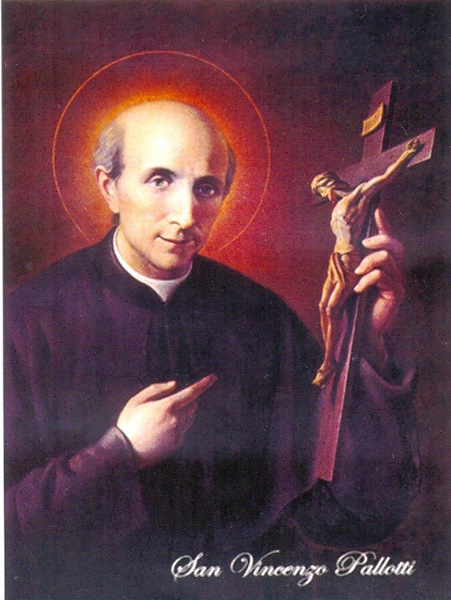
Saint Vincent Pallotti (1795-1850) was a Roman priest who, through his profound spiritual life, his numerous apostolic activities and his consequent realisation of his prophetic vision of the apostolate, had a considerable influence on the history of the Church of the 19th century.
He lived in a time in which the foundations of the modern world and of a new socio-political order were laid. The ideas of illuminism, the turbulence of the Napoleonic period, the birth of the so-called worker question which blossomed with the publication of the “Communist Manifesto”, the liberal tendencies, the national movements in Europe and the development of mass printing were only some of the events which characterised the times of Saint Vincent Pallotti. At the same time Adolf Kolpng was working in Germany, Frederic Oznam in France and Antonio Rosmini in Italy.Pallotti saw the problems which were attacking faith and the increase of tasks linked to the proclamation of the Gospel in mission countries. In the face of such problems, which the Church had to confront, Pallotti directed his attention towards the urgent necessity of reviving faith and re-enkindling charity among Catholics in order to bring the good news of salvation to all people.
In the area of the city of Rome, together with a group of collaborators, he developed a massive structure of apostolic activity. At the same time, he strove to unite and co-ordinate such activity. From this arose the idea of founding a new institution, that is, “the Union of Catholic Apostolate”, to unite all of the initiatives of apostolic activity.In numerous writings, Pallotti develops a global vision of the work of the Church, so that the good news could be carried to all people in an ordered and systematic way.Saint Vincent Pallotti died on January 20th 1850 without having seen the full development of his work. His closest collaborators continued his mission, ensuring further development of the Society. Vincent Pallotti was beatified in 1950 and canonised by Pope John XXIII on 20th January 1963 during the Second Vatican Council.
Source: http://www.pallotti-sac.org/en/saint-vincent-pallotti.html [May 23rd, 2011]
Contact:
Società dell'Apostolato Catttolico
Piazza s. Vincenzo Pallotti, 204
00186 Roma
Tel.: + 39 (06) 68 19 469
Email: This email address is being protected from spambots. You need JavaScript enabled to view it.
CANA Marian Formation Centre: Marian Fathers
Cana Formation Centre is an apostolic service of the Congregation of the Marian Fathers of the Immaculate Conception. The project officially started on May 18th, 2004, when the agreement of collaboration between the diocese and the congregation was signed. The formation centre is intended for retreats and recollections, sessions, meetings, etc. Special attention is reserved for the Marian spirituality. With time, Cana Centre could, according to its statutes, serve as scientific research centre for developing and popularizing Marian theology.
At the same time, pilgrims are welcome to lodge in this centre. As the local ordinary declared, however, Cana is not to become neither an independent place of pilgrimage in the region of Kibeho, nor a new centre of the mercy of Jesus - despite a big statue of merciful Jesus on the grounds of the centre, which will impress all visitors.
"Regina Pacis" Centre: Benebikira Sisters
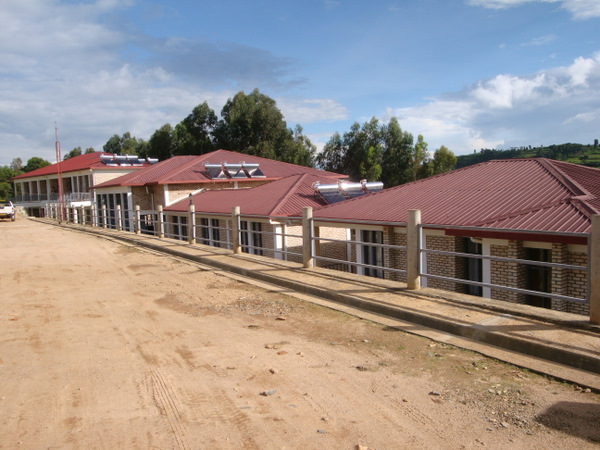
The Regina Pacis Centre is the property of the Benebikira Sisters. It offers various services to pilgrims: accommodation, catering, multi-purpose halls and many other services which the pilgrims and all those who visit Kibeho may need
Groupe Scolaire St. Paul: Parish of Kibeho
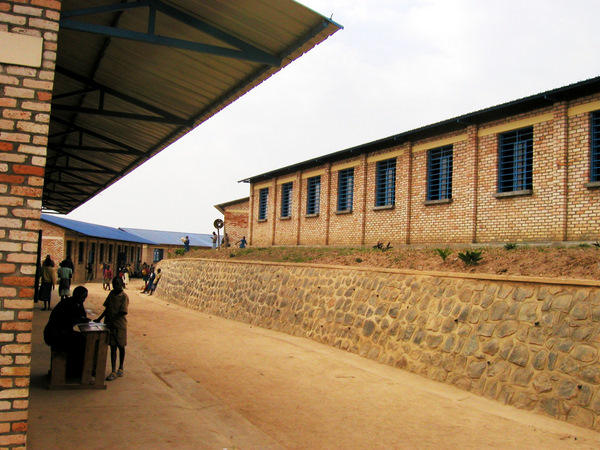
As the parish of Kibeho was growing, it was necessary to transfer and rebuild the original primary school of Kibeho slightly away from the site of the shrine in order to extend the esplanade of the parish church as well as to create a space more conducive for the discipline of the children attending this school.
This action led to create a large complex of buildings including a primary and a secondary school. Since 2009, the complex is called Centre Scolaire St Paul.
Training of children and Youth: Sisters disciples of Jesus in the Eucharistic
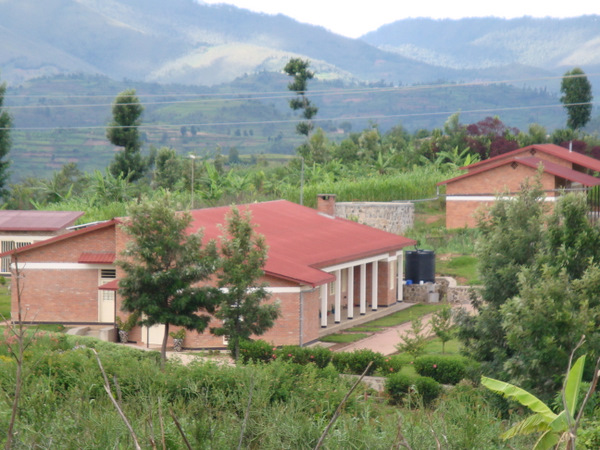
The Sisters Disciples of Jesus in the Eucharist arrived in Kibeho on January 24th, 2007 and contributed to the activities around the shrine. Among the major traits of their contribution, there should be mentioned the skill training centre for young girls from poor families, as well as a kindergarten and Catechism lessons.
The skill training centre is devoted to "Mons. Raffaello Delle Nocche” and offers professional training as well as human and Christian formation for girls with a poor family background who didn't have the chance to attend secondary high school.
The kindergarten “Mirella Monti” welcomes all children at the age of 4 to 6. For the Sisters Disciples of Jesus in the Eucharist, pre-school education is one of the means of evangelisation and affects not only the children, but also their parents and families. Through family and academic knowledge, the children are prepared for a better future. At the same time, they train basic human and social skills as the basis of Christian life. The families ensure the well-being of the children through regular meetings during which they share the gospel as well as experiences that can help the children. Parents also benefit from this opportunity to meet and share the problems of everyday life and they seek how to help each other.
The Sisters Disciples of Jesus in the Eucharist are specifically concerned with the catechesis of children who are preparing for the sacraments of Christian initiation: Baptism, first Holy Communion and confirmation. The Sisters “welcome with gratitude and a great sense of responsibility, the call to serve the Church as extraordinary Ministers of Holy Communion" (Const. N ° 69) and are sensitive to the problem of vocations. Thus, they animate vocational groups to discover the signs of the call to religious life in youths.
Address:
Sisters Disciples of Jesus in the Eucharist Kibeho
P.O. Box 341 Butare
Rwanda
Email: This email address is being protected from spambots. You need JavaScript enabled to view it.
Tel: + 250 / 788 77 20 30
Founder and history of the congregation
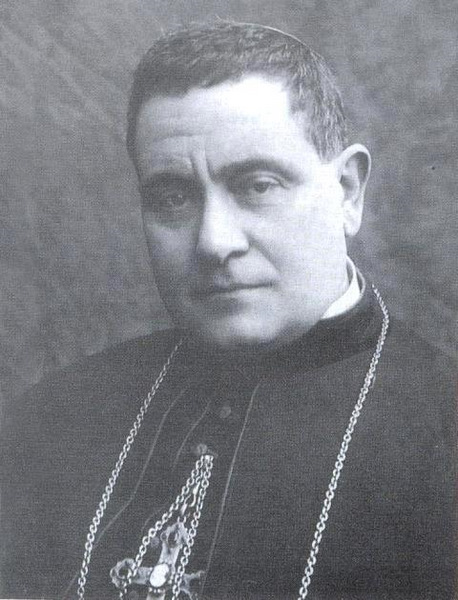
The servant of God Raffaello Delle Nocche was born on April 19th, 1877 at Marano, Naples. In his family, Raffaello received an education marked by a sturdy piety. At the age of seven he started primary school. From 1889 to 1894 he attended the Vittorio Emmanuel Institute of Naples. In 1894 he entered the Seminary of Naples despite his father's resistance, having a very clear and firm idea about the priestly vocation.
Raffaello Delle Nocche was ordained priest on June 1st, 1901. From 1901 up to 1915 he was the secretary of Bishop Trama. In November 1915, he was appointed rector of the seminary of Molfetta. In 1919 he returned to Marano. He was very pleased to have received the privilege from the Holy See to adore the Blessed Eucharist in his house. On February 11th, 1922, Pope Pius XI appointed Mons. Delle Nocche Bishop of Tricaco. On July 25th, he was consecrated Bishop in the Church of Sapienza, Naples. On September 8th, 1922, he solemnly entered into the services of the Diocese of Tricarico.
A few months after his entry into Tricarico, he was received by the Pope to whom he presented the situation of his diocese: the abandonment of the children and the youth and his difficulties in finding religious available for this social apostolate. Pope Pius XI told him: “Why does the Bishop of Tricarico not think of founding a religious congregation?”
This was an inspiration for Raffaello Delle Nocche.
Thus, the history of congregation started on October 4th, 1923, with the arrival of the two first appointed Sisters at Tricarico. In March 1926, Pope Pius XI gave a name to the new congregation: Sisters Disciples of Jesus in the Eucharist. On August 14th, 1927, the founder canonically erected the congregation within his diocese. On May 24th, 1943 the congregation obtained the decree of praise from the Pope Pius XII and the official approval on June 23rd, 1952.
In March 1960, terrible symptoms of bad health were manifested and after only a few months, on Friday, November 25th, 1960 at 17:15, Delle Nocche died.
Charisma and apostolate of the congregation
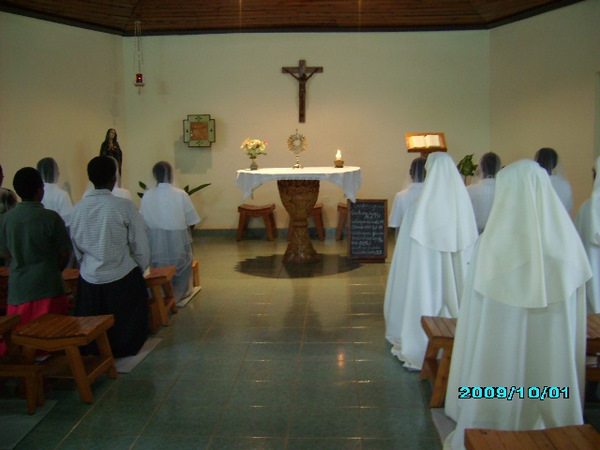
The Congregation of the Sisters Disciples of Jesus in the Eucharist was founded in 1923 in Tricarico, Italy, by the Bishop of this diocese, Raffaello Delle Nocche, incited by the urgent needs of apostolate among the poorest in the Southern region of Italy.
The charism of the Congregation is:
- The perpetual adoration of Jesus in the Holy Eucharist;
- Reparation of the offenses committed against him in the sacrament of his love, especially on the part of persons who are consecrated;
- Prayer assiduous to the heavenly Father so that he may send workers to harvest in his field and his reign may reach in all corners of the world.
- By the love for the Eucharist, the Disciples live a devotion to the Blessed Virgin, venerated particularly under the title of Mother of Sorrows, first Disciple of Jesus, the most perfect worshiper and reviver of life.
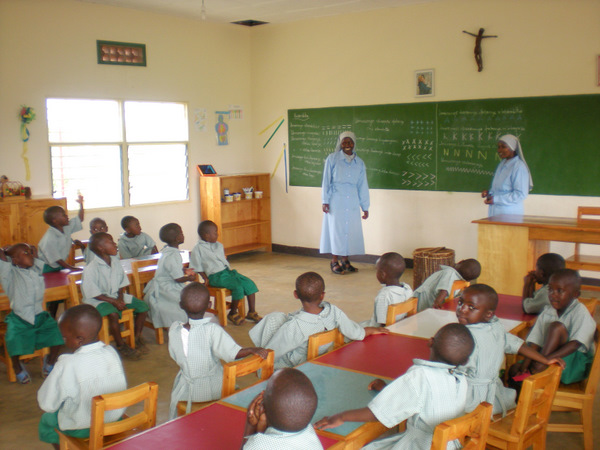
This charism is lived through a simple, humble, joyful life style, devoting preferably in the most underprivileged areas.
The characteristics of the apostolate of the Sisters Disciples of Jesus in the Eucharist are eucharistic, vocational and Marian. Their apostolate consists of catechesis and other forms of evangelisation, education of the children and the youth; assistance to old people and other charitable activities. Today the Sisters Disciples of Jesus in the Eucharist are present in Italy, Brazil, Rwanda, Philippines, Indonesia, Mozambique and they will soon be in the Vietnam.
They arrived in Rwanda in 1975 and they began their activities at the Apostolic Nunciature. In 1978, they opened a house in Kicukiro, Kigali Archdiocese. Another house in the parish of Nyarurema, Byumba Diocese, opened in 1989, was closed again in 2003. In 1993, they started a mission in the parish of Musha, an outstation of Kigarama erected into a parish in 2006.
Finally, on January 24th, 2007, the Sisters Disciples of Jesus in the Eucharist arrived at Kibeho.
Spirituality
The spirit of the founder is strongly reflected in the constitution of the Sisters Disciples of Jesus in the Eucharist and in their spirituality. Delle Nocche was a very humble perpetual worshiper: During his earthly life, he always and with fidelity gave time for prayer which also vivified his multiple apostolic activities, his social relations and even his tiniest actions with great spirit.
The dominate idea of the founder becomes the dominate thought of the disciples: "Magister adest et vocat te." (The Master is there and he is calling you!)
Eucharistic life must expand the hearts of the Disciples of Jesus in the Eucharist and make them beat to the rhythm of the Church, mystical body of Christ.
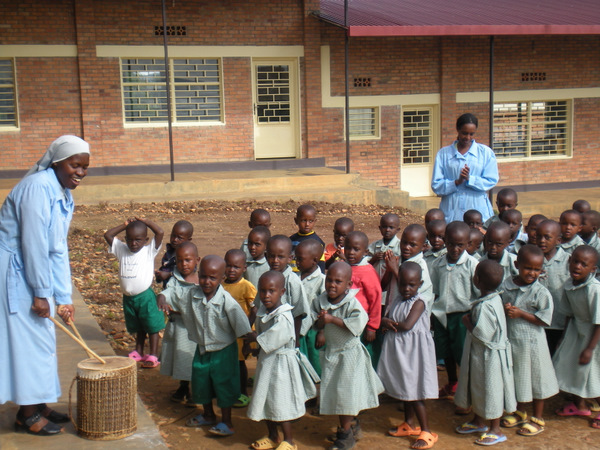
The perpetual adoration
The perpetual adoration of the Blessed Sacrament is their primary aim. "It is in the Eucharist that the Disciples find the root of their vitality and their mission: they give praise to the father, through Christ and in the spirit, and tend all their forces to the fullness of baptismal grace in the exercise of charity." (Const art. 2).
The Disciples have a particular devotion to the Virgin Mary: "The Congregation is entrusted to the maternal protection of Our Lady." The Disciples imitate her being the first worshiper and reviver of life. They honour all virtues and all privileges which God has enriched her with. They invoke her especially under the title of Mother of Sorrows. "They honour her by specific acts of Marian piety, such as the Holy Rosary” (Const. s. 58) and the Rosary of the Seven Sorrows.
This makes them feel very close to the spirituality of Our Lady of Kibeho.
The education of the youth
Education of the youth is an essential element of the mission of the Church. In Rwanda it has a particularly important role in reconciliation and reconstruction of peace. Where they are present, the Sisters Disciples of Jesus in the Eucharist give themselves to this task through vocational schools. In these school, girls who have not had the chance to attend secondary school have the opportunity to have a professional training as well as human and Christian formation.
The education of children at the kindergarten of Kibeho
For Sisters Disciples of Jesus in the Eucharist, pre-school education is one of the means of evangelisation. Through their kindergarten, they prepare the children in Kibeho for a better future.
Sharing with the poor
Sharing with others is also an apostolate that the congregation values to improve the conditions of human life in their own way of being and living. The sisters eat local food cultivated by themselves in their fields, which give a good testimony to the population. They assist vulnerable people. This assistance to the poor is developed in the sense of hospitality, availability, forgiveness and reconciliation.
Contact: This email address is being protected from spambots. You need JavaScript enabled to view it.
Health Centre Kibeho: Missionaries of the Catholic Apostolate Sisters (Pallotine Sisters)
The Pallottine Sisters at Kibeho
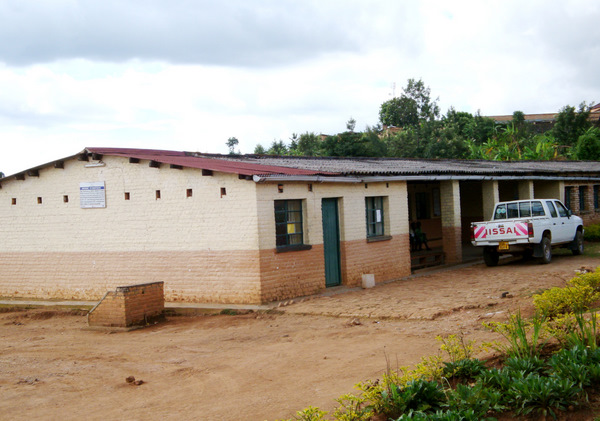
We are Missionaries of the Catholic Apostolate Sisters known as the Pallottine Sisters; founded by St. Vincent Pallotti. We are part of a great religious family named Union of the Catholic Apostolate (UCA), officially recognised by the Church on April 4th, 1835. This family unites priests, brothers, sisters and the laity, who, with the gift of the Holy Spirit, live in communion according to Pallottine spirituality and charism.
At Kibeho, we are at the service of the sick at Kibeho Health Centre, to give medical care not only to pilgrims in need but also to the entire population of the region.
At the Shrine of Our Lady of Kibeho, we are at the service of pilgrims, welcoming them and offering them services for their spiritual formation. We take care the shrine and welcome pilgrims, who want to mediate more deeply, in our community.
Contact:-Tel.: + 250 / 78 38 67 718
Email: This email address is being protected from spambots. You need JavaScript enabled to view it.
Our presence in the world
We are present on all continents of the world where we are involved in catechesis, service to the sick, the poor, orphans and abandoned or marginalised people, in schools and pastoral centres as well as in other services of the Church – wherever we are needed.
Here in Rwanda we have four communities: two communities in Masaka and Gikondo, both part of the Archdiocese of Kigali, one community in Ruhango in the Diocese of Kabgayi and another community in Kibeho in the Diocese of Gikongoro.
Spirituality and charism
St Vincent's spirituality was especially marked by his deep desire to revive faith to re-enkindle charity as he worked with rich and poor alike. As a child he gave his own food and clothing away to those who saw the need. Throughout his life his constant concern was to relieve the sufferings of those around him. He died shortly after giving his coat to someone else who was cold.
He taught that every human being is a mirror of God, worthy of reverence and love. He also taught that the role of each Christian is to be a sacrament of Christ’s presence in the world. He was a warm friend and a compassionate spiritual director.[1]
Thus, our founder left to us with a message of faith, hope and charity. He teaches us spontaneity and hospitality, solidarity with every person we meet, sad or joyous, and asks us to be open to all. He left us with a message of simplicity and humility. He is our role model in the total consecration of oneself which draws the vitality in the orison, silence and meditation of the word of God.
For Pallotti, the Virgin Mary was the example of the total surrender to God's love. This is why he invoked her as Queen of the Apostles and we kept her as patron of our Congregation and the whole Pallottine family. We work in favour of co-responsibility of all the baptized to revive the faith, rekindle the charity and spread it in the Church and the world, so as to bring everyone to unity of faith in Christ.
In short: Our charism is universal. We read the signs of time to meet the needs of our Church.
[1] http://www.pallottines.ie/who-we-are/st-vincent-pallotti [May 23rd, 2011]
Educational Institute for Blind of Franciscan Sisters Servants of the Cross
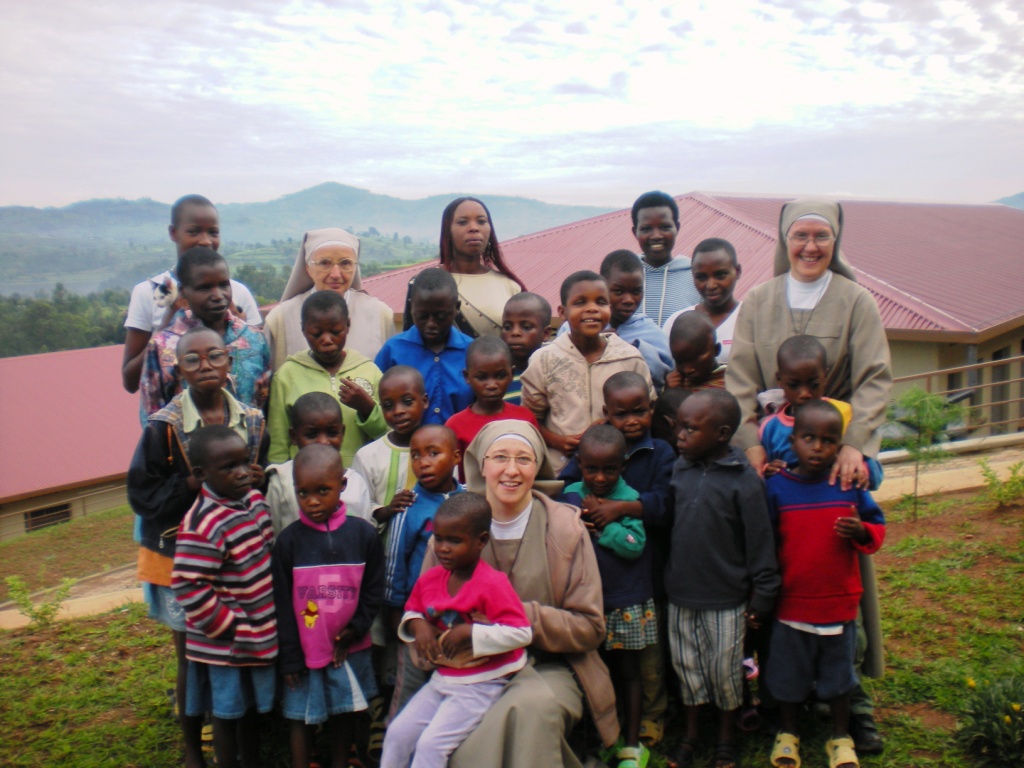
Rwanda is one of the smaller African countries located in the heart of the continent. Due to its geological formation, Rwanda is called the land of the thousand hills. For its inhabitants, it is now the country of thousand problems and thousand hopes.
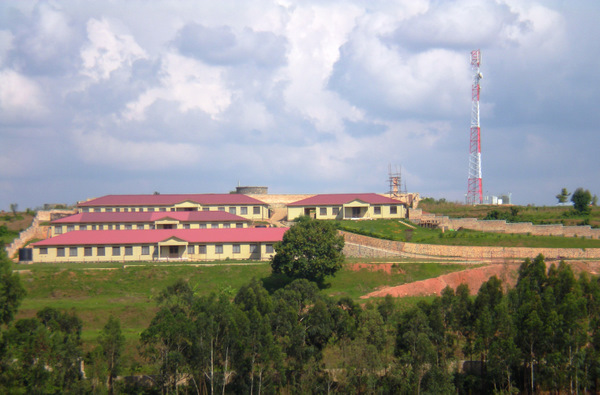
Rwanda counts approximately 64 thousand non-sighted, from which 20 thousand are children. Among the most frequent reasons of blindness, we must mention the complications due to meningitis and measles vaccine shortage; many children lose sight due to malnutrition or sun and dust allergy, another reason concerns genetic diseases.
The first Franciscans arrived in Rwanda in 2006 at the invitation of Mons. Augustin Misago Bishop of the Diocese of Gikongoro.
The religious community of the Franciscan Sisters Servants of the Cross was founded at Kibeho on July 1st, 2008.
The Centre for education and training for the blind began its activity with the first group of children in September 2008.
our pupils
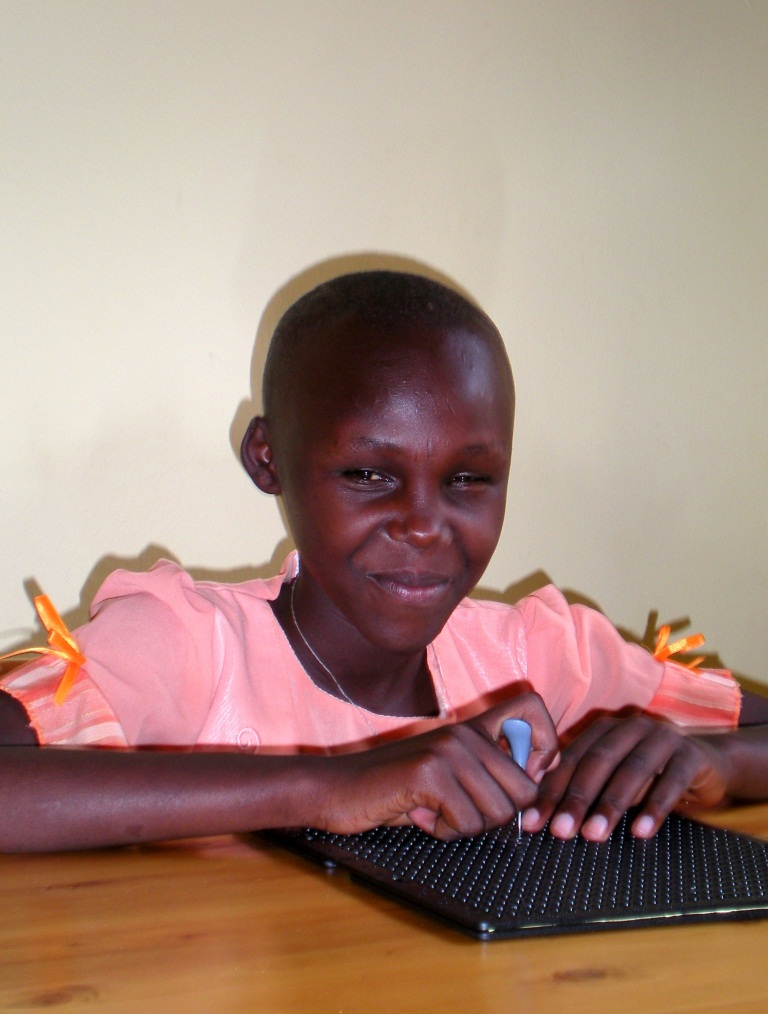
Presently 60 children attend the school which was opened in January 2009 (the centre can provide education and support for 100 students). The children come from all over the country.
The Centre of Kibeho was officially opened and consecrated on September 29th, 2009.
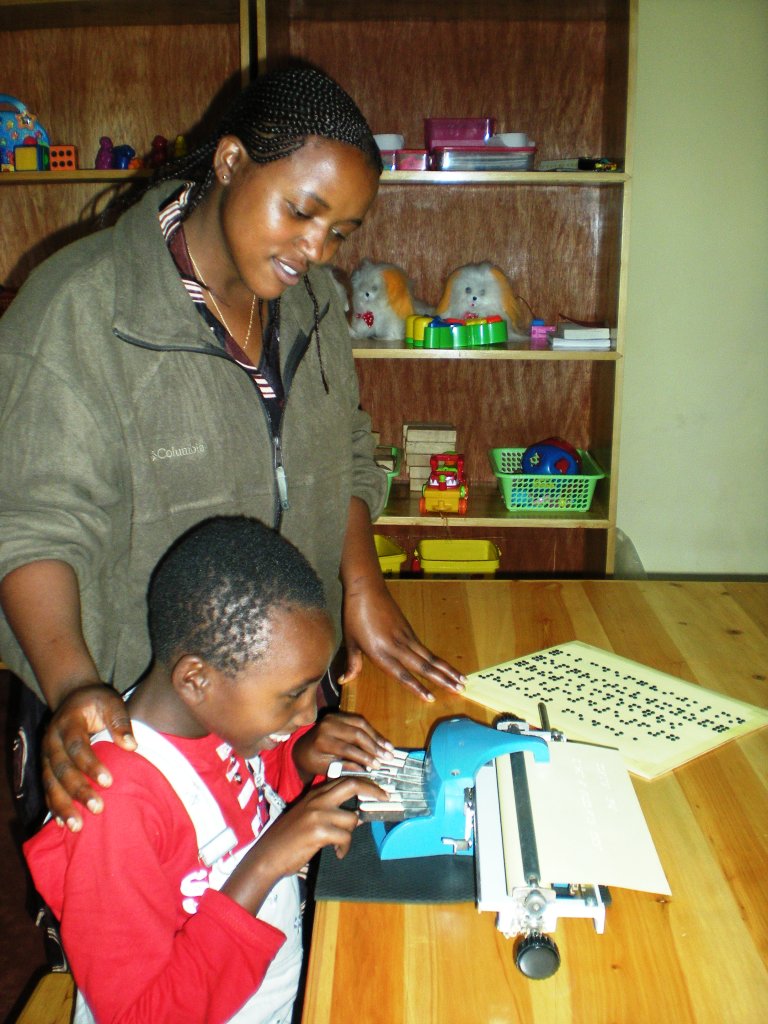
The school conducts a program of instruction by relying on digital methods. In the boarding school the children learn to manage household cores and activities of daily life by themselves so that they can blend in society as independent and rehabilitated people. The most gifted students can then continue studies in secondary schools and higher educational institutions.
We hope that the protection and love of the Mother of the Word may manifest itself in charitable actions. And then, guided by her, we want to assist the blind people of Rwanda. At Kibeho the blind children enjoy their childhood and find faith in their humanity.
They represent a sign of hope for their families. May the testimony of their life be a source of comfort and may the light of faith enkindle on all those who come here for pilgrimage.
Address: Franciscan Sisters Servants of the Cross
Kibeho, P.O. Box 449, Butare, Rwanda
Email: This email address is being protected from spambots. You need JavaScript enabled to view it.
Franciscan Sisters Servants of the Cross
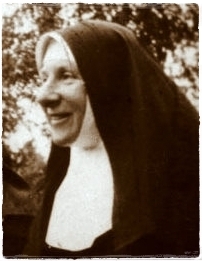 The main purpose of the Congregation is to glorify God by serving those who are whether physically or spiritually blind.he Congregation of Franciscan Sisters Servants of the Cross was founded in 1918 in Poland by Mother Elizabeth Rose Czacka, who was a blind person.
The main purpose of the Congregation is to glorify God by serving those who are whether physically or spiritually blind.he Congregation of Franciscan Sisters Servants of the Cross was founded in 1918 in Poland by Mother Elizabeth Rose Czacka, who was a blind person.
In serving the blind at every stage of their lives, the Sisters aim at helping the blind to carry their cross in love of God and thus they are associated to the work of redemption.
The patron of the congregation is Saint - François d'Assise. The love for liturgy and in particular the Eucharist should be the inner motivation to animate the Sisters' tasks and their day-to-day matters. It is because of the individual and collective prayers that the Sisters try to enter in the life of Christ and to bring him to everyone they meet.
The most important apostolate of each Sister is the apostolate of interior prayer and penance as well as the personal example of goodness and serenity.
We are engaged in:
- education, vocational and general training, physical rehabilitation, in schools, pre-schools, boarding and day schools;
- assistance to persons who lose sight and to those who have become blind;
- assistance to adult students or those who exercise various crafts and trades;
- services for librarians who would like to make interesting books in Braille or multimedia e-books public (mostly Catholic books).
- the organisation of meetings, retreats and pilgrimages, holiday tours, recreation, re-education courses, etc.
- assistance to old, blind and disabled people (at home, in hospitals or institutions);
- administrative tasks, the secretariat or management in the institutions for the blind and the establishments where we work;
- the propagation of the problems of the world of the blinds for sighted people through debates, press articles, books or other means;
- We conduct wherever possible the research in Tythlology.
We take great care of the spiritual needs of blind persons by facilitating access to the truths of faith to children and young people. Only faith can indeed enable the blind to accept his blindness not only as a trial but also as a gift from God.
We realize our apostolate not only for the blind but also with them. Through prayer, sacrifice and in each contact with the blind, we encourage them to become Apostles themselves. This objective is achieved at the point where the blind, through their own example and the sanctity of their life and even pastoral activity, become the light "for the blind in the soul" – to people who live far from God because of their unbelief or sin, who do not understand the meaning of suffering and have their eyes closed to the true values of the inner world.
Spiritual blindness is also the blindness of the non-believing.
The objective of all activities of the congregation is to bring together those who see and those who do not see God and to undertake a missionary activity devoted to the service of blind people and to evangelisation.
The Franciscan Sisters Servants of the Cross work in Poland, Italy, the Ukraine, in India, South Africa and Rwanda.
At the time of their vows, the Sisters commit their life to worshiping God with deeper love and to loving their neighbours.
The instrument and assistance in this development is self and human education, Christian and religious formation in the spirit of the Congregation.
The Sisters' initial formation has three basic stages: Postulancy, novitiate and juniorate. The postulants, novices and juniors discover the beauty as well as the difficulties of religious life more and more as they prepare for their final vows, taking into account that this kind of life imposes self-denial and that they will give themselves entirely to God.
The emphasis is placed first of all on the mutual formation of the candidates and over the years moves on to the self and personal liability development. This period involves what is called on going formation in all areas of life. This is why the religious formation never ends. It continues up to encountering God in the eternity.
We welcome in our Congregation all blind people who wish to serve God through a pious life according to the Evangelical councils.
The mystery of this work is hidden in the arms of the Cross of Christ to whom all must give homage: blind people, lay persons and the Sisters.
Our greetings to you all,
BY THE CROSS – TO HEAVEN
For more information on the Congregation of Franciscan Sisters Servants of the Cross in Polish please visit our website: www.triuno.pl
Foundatrice Mother Elisabeth Rosa Czacka
Countess Rose Czaka was born in 1876 in an aristocratic family well known in Biala Cerkiew in the Ukraine. She received a complete and multidisciplinary formation and was raised in a deep faith. Through her father, Rose acquired knowledge in economics, something very rare for women of that time.
From her childhood, she was menaced with blindness from which she eventually lost sight at the age of 22. A Polish ophthalmologist warned her of the inevitable blindness but at the same time he was encouraging her to look after the blind people of Poland who were left on their own until then.
This news was a great shock for her, but she accepted it with faith and she recognised it as a vocation. She had the intention to prepare the blind for normal life in the society of sighted people and through faith bring them back to the meaning of life and openness to others.
The preparation for this new task took her some ten years in which she learned Braille writing and rehabilitation exercises. During her visits in schools for the blind abroad, she was always attentive to look for models and ideas to begin her activity in Poland.
In 1911 her work took concrete shape: In the Association of Assistance to Blind People, which is active until today.
World War I separated the Countess from her students and she was forced to remain in Zytomierz in the Ukraine. For Rose, it was a time of the spiritual retreat in which the idea for the foundation of a new religious order was born. This order was designed to assist non-sighted people at every stage of their lives.
After obtaining the accord from the Bishop, Rose Czacka accepted the habit of the third order of Saint-François and on August 15th, 1917, she made her vows and took the name of Sister Elizabeth.
When she returned to Poland in the month of May 1918, she continued her work despite many obstacles as she received the accord to receive new candidates in her Congregation, which from December 1st, 1918 bore the name of " Franciscan Sisters Servants of the Cross ".
In 1922, Mother Czacka got a few hectares of land at Laski, a small village near Warsaw. She started building a centre for the blind and a house for the Sisters. Later the name "LASKI" would become the symbol of all the work created in common by blind people, lay persons and religious.
The desire of the Mother was that well rehabilitated blind people were not only to be perfectly prepared for professional life but above all had to accept the cross of their blindness with trust and become Apostles among the sighted people which had lost faith and the true meaning of life. The work was more widespread with the active participation of Father Wladyslaw Kornilowicz, appointed spiritual leader of the Congregation and their apostolate. It is through his dedication that the centre of Laski became one of the strongest centres of revival for Catholicism and the liturgy in Poland.
During World War II, Mother Elizabeth was seriously injured but she returned to Laski to direct the renovation of the Centre, destroyed in military battles. Many people were surprised by her exemplary heroism and total devotion to God.
In 1950, Mother Czacka passed the direction of the order on to her successor and devoted herself to prayer and offered her suffering for the good of Laski. She died on May 15th, 1961, surrounded by kindness and regarded by everyone as "a Saint".
The process of her beatification is currently in progress in Rome.
Religious formation
The Congregation of Franciscan Sisters Servants of the Cross is open to anyone who wants to totally and in all sincerity devote her life to God and follow the way of Christ by living the evangelical councils in accordance with the specific character of the congregation. She must comply with the rules laid down by ecclesiastical law. We also welcome non-sighted people.
The membership in the congregation is preceded by a general interview which should make clear whether the desire of a candidate to live monastic life is really a response to a call from God.
If the two parties (the candidate and the congregation) are favourable, we fix the entry date.
Aspirancy (1-2years) – Beginning of the candidacy period.
Postulancy (1-2 years) – Time for getting to know your true vocation by helping with various tasks in relation with blind children.
Novitiate (2 years) – Period dedicated to the monastic spiritual life. In this period we prepare the novice for the vows.
Temporary profession – After completing the novitiate, the new Sister takes the vows of chastity, poverty and obedience for a period of one year and renews them annually until the time when she takes her perpetual vows.
During her first vows, the professed receives a new name and the habit as a sign of belonging to the monastic family.
Juniorate – Period following the temporary vows which prepares the Sisters for the perpetual vows.
Perpetual profession – This is the moment of when the Sisters take their final vows to live in full communion with Jesus Christ and the monastic congregation through the evangelical councils.
"Nazareth" Centre: Abuhire ba Nyina wa Jambo:
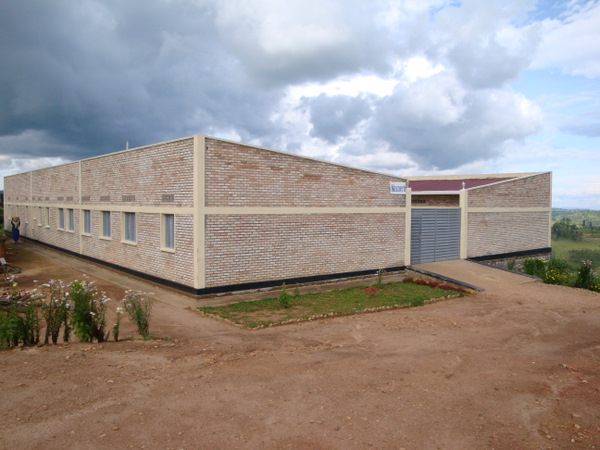
The Abahire ba Nyina wa Jambo (The Blessed of the Mother of the Word), are a religious congregation which wants to be guided by the life of the Virgin Mary in Nazareth and to radiate the spirit of the Beatitudes in their neighbourhood according to Mt 5, 3-10. Their founder is Mons. Louis Gasore. This congregation has been currently approved and is governed by the Bishop of the Diocese of Nyundo as Public Association of the Faithful.
The congregation was founded due to the challenge of the message of our Mother od the Word at Kibeho “to be her beautiful flowers”. Thus, in their development, the Abahire ba Nyina wa Jambo erected a community at Kibeho to live there as the "beautiful flowers" the Mother of the Word wished for.
The Abahire ba Nyina wa Jambo at Kibeho lead a simple life, dedicating themselves to look after the shrine and to offer hospitality to pilgrims.
They offer lodging for pilgrims with poor financial means and for all those who wish to do retreats at Kibeho.
Contact : + 250/ 78 32 43 116
The Flowers of Mary
Our Fraternity:Indabo 1
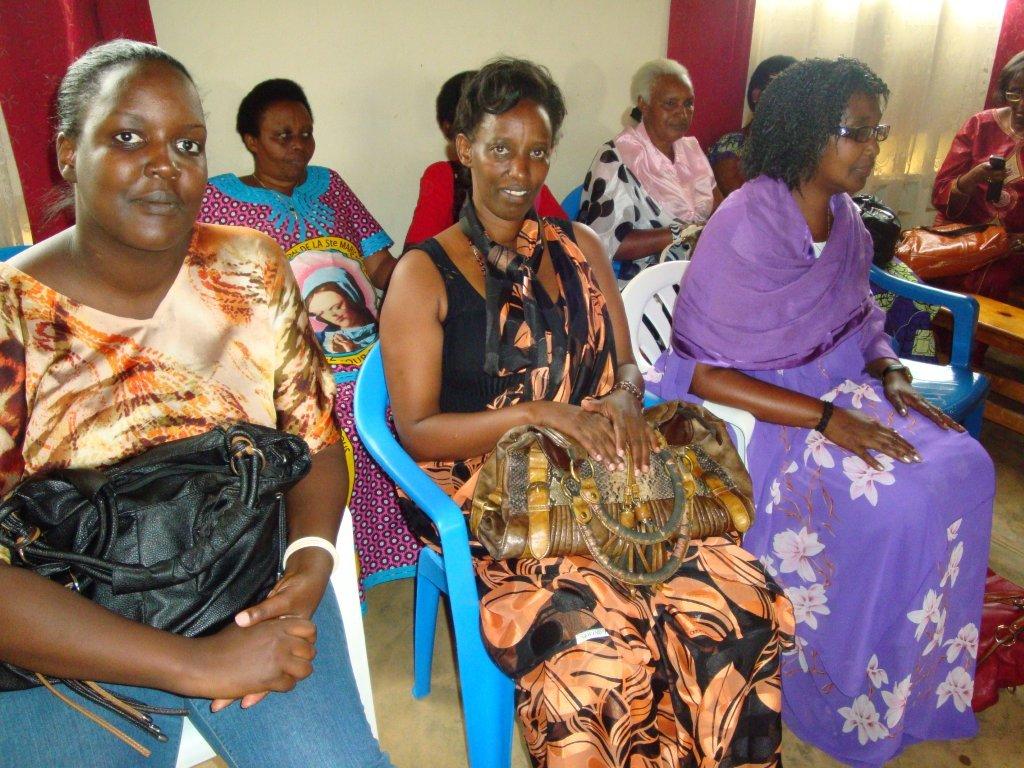
It was born on 25th December 2004, after the Christmas Solemn Mass.
After mass, some of us met in the front yard of St. Michael Cathedral in Kigali and as we talked, we decided to make a devotional visit to the Mother of Jesus at Kibeho, in appreciation of her apparitions in Rwanda. The same group decided to make a pilgrimage every month. The original intention was to be present there, representing all Rwandans and all peoples of the whole world. Mary the Mother of the Word tells us in her messages at Kibeho: ‘I came for the whole world’. Since then in addition to the usual pilgrimages we make on feast days of the Sanctuary, each last Sunday of the month, we make a pilgrimage to Kibeho in honour of the Mother of God.
Our appellation:
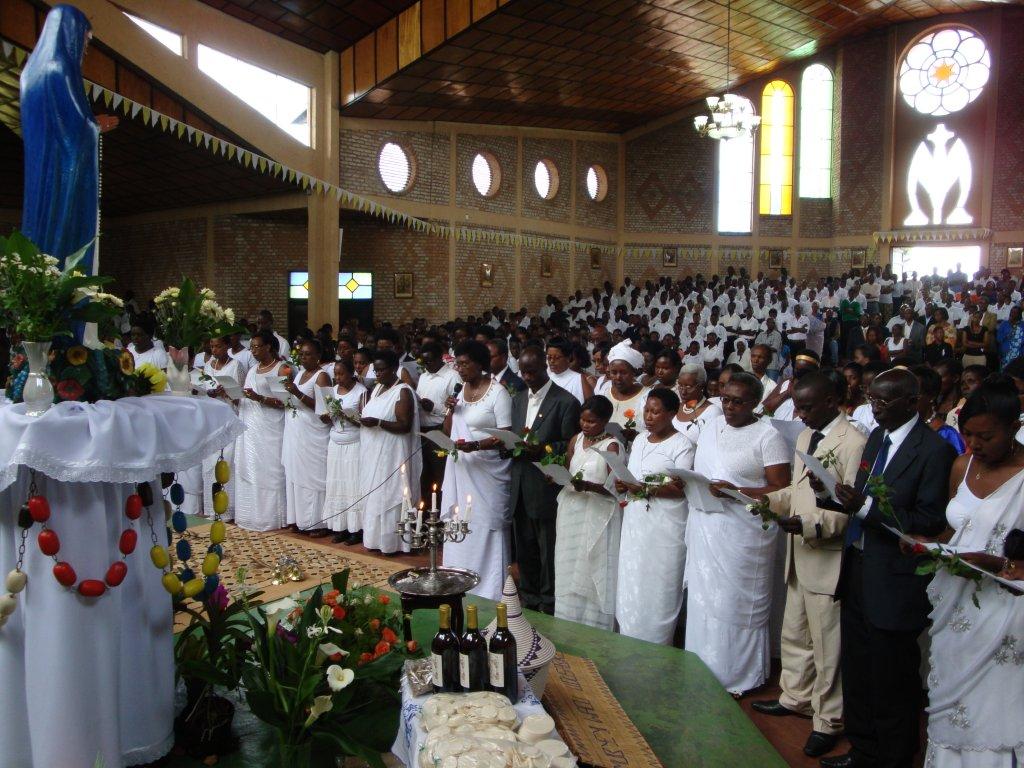
As pilgrims presented their intentions at Kibeho, the then Chaplain of the Sanctuary of the seven sorrows of Mary; Father Chrysanthe Rwasa, thought of giving our group a name: “The Flowers of Mary”, in memory of the apparitions, as Mary was always seen by the visionaries standing in a big flower garden (She saw all her children as flowers) and she asked often the visionaries to water her flowers as a sign of the blessings that she brought for us.
Since then, that symbolic name acquired deeper meaning because of many other occasions and joyful circumstances in our numerous relationships: with the Mother of the Word, our souvenir of the manifestation of Mary to the visionaries at Kibeho, that of the Queen of Hearts especially on the feast of Immaculate Conception in 2009, with the Fraternity of Mary, Queen of Hearts, we were connected to the Fraternity of lay people by our spiritual leader, St. Louis de Montfort, then the Priests of the Company of Mary, the Sisters of the Daughters of the Wisdom and the brothers of St. Gabriel.
With time, the association “The Flowers of Mary” Mother of the Word, Queen of Hearts opened its doors to all the faithful (lay people, clerics and religious). Whoever wants to join that spiritual journey and apostolate as proposed by St. Louis Grignon de Montfort. For the religious the Canon Law no. 307 paragraph 3 must be considered.
We receive in our association the person who accepts to undergo the necessary formation and preparation (about one year), then consecrates himself or herself to Jesus, Eternal Wisdom and Incarnate, through the guidance of Mary in accordance to the formula of St. Louis-Marie de Montfort.
The incorporation in the association is asked in writing by the candidate, who is accepted by the General Assemble after having consecrated himself / herself in the presence of the director or his delegate and is then written in the registrar of the association.
Some News in brief:
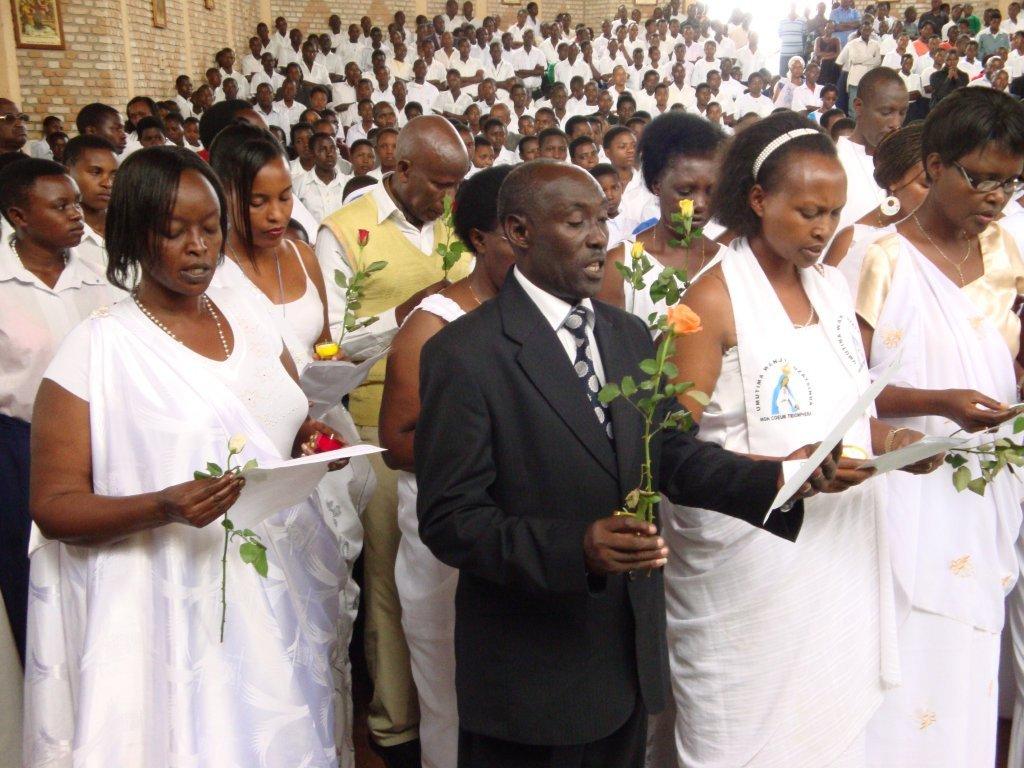
In 2006, the Association had its first group of 25 consecrated members.
Today, we are 114 and we have new members each year as the old ones renew their consecration. There are more than 150 sympathisers who are making the journey with us waiting for their final decision. Our consecrated members are mainly lay people, a priest, Dominique Mukandori and Brother Jean Chrysostome Rurangirwa of the Brothers of St Gabriel.
We are in a number of dioceses as in Kabgayi, which has already officially recognised us, in Butare and Gikongoro and parishes of Kigali Archidiose where we have our main office.
During the first term of each year, we have 33 days in preparation for the consecration, followed by teachings, seminars, recollections and retreats. They are given by bishops, priests, religious and consecrated lay people; throughout the year.
The Flowers of Mary in Muhanga have more than hundred young people and children following in the steps of their elders, and they too consecrate themselves in December of each year, following the same formula; to Jesus by Mary in preparation for the Good News, imitating Mary. This has been a source of vocations to religious life. Among such children, two are already in minor seminary preparing themselves for priesthood.
Those of Kicukiro Parish do the same thing with the youth, whereas in Kibagabaga in Regina Parish Remera, they carry on acts of charity visiting the sick in the nearby hospitals. Others privately look after the needy. In such a group we have Bosco Bigirindavyi and Caritas Kabanyana.
Our Directive Committee:
- Mme Emerita Mukayiranga, Coordinator; tel: +250/78 830 43 80.
- Mr Simon Pierre Pierrot Uwamungu, Vice Coordinator; tel; +250/78 841 47 17.
- Mme Mika Inamahoro, Alice Nasabwe, Odette Mukantagara, secretaries.
- Miss Brigitte Dusabe and Mme Colette Nujjawingoma, treasurers.
Our Ministries;
For the sake of harmony, in addition to the Directive Committee, we have put in place different ministries in which one works according to one’s talents and capacity: Transport and logistics, reception, internal communication, spirituality, public relations, relation with Kibeho, spiritual intercession, consecration, social affairs and partnerships with other Monfortians.
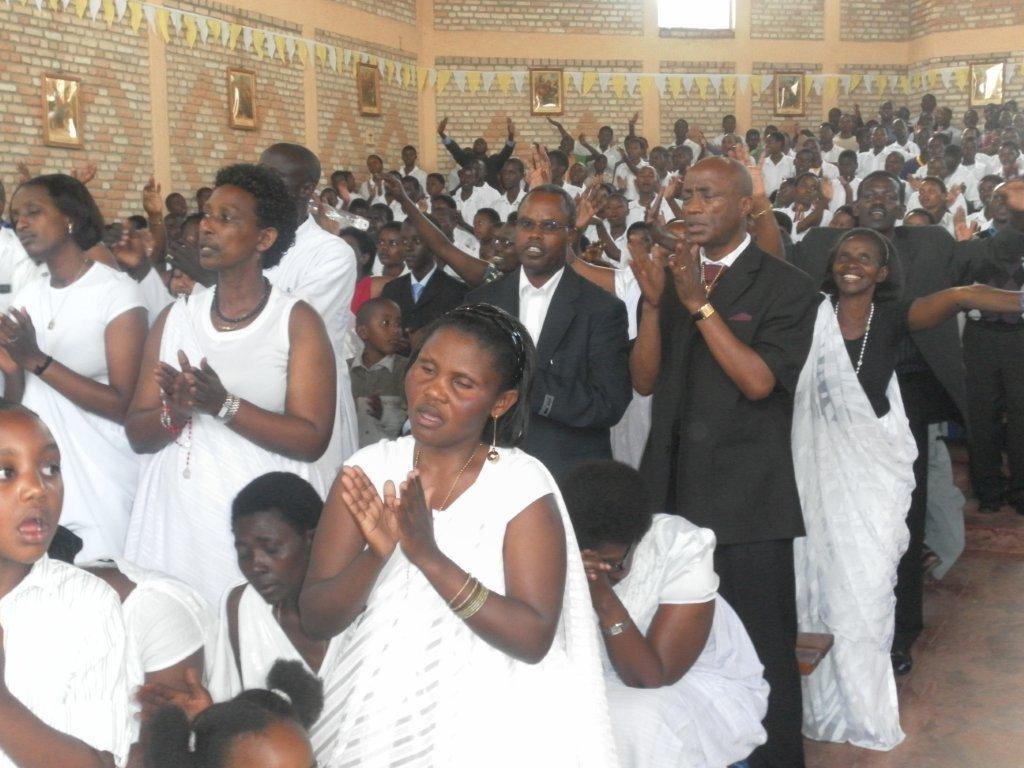
All by Mary, for Mary, with Mary, and in Mary, in the name of the Father and of the Son and of the Holy Spirit. Amen
On behalf of the Group;
- Emerita Mukayiranga, Coordinator
- Pierre Pierrot Uwamungu, Vice Coordinator
- Jean C. Rurangirwa, Spirituality




